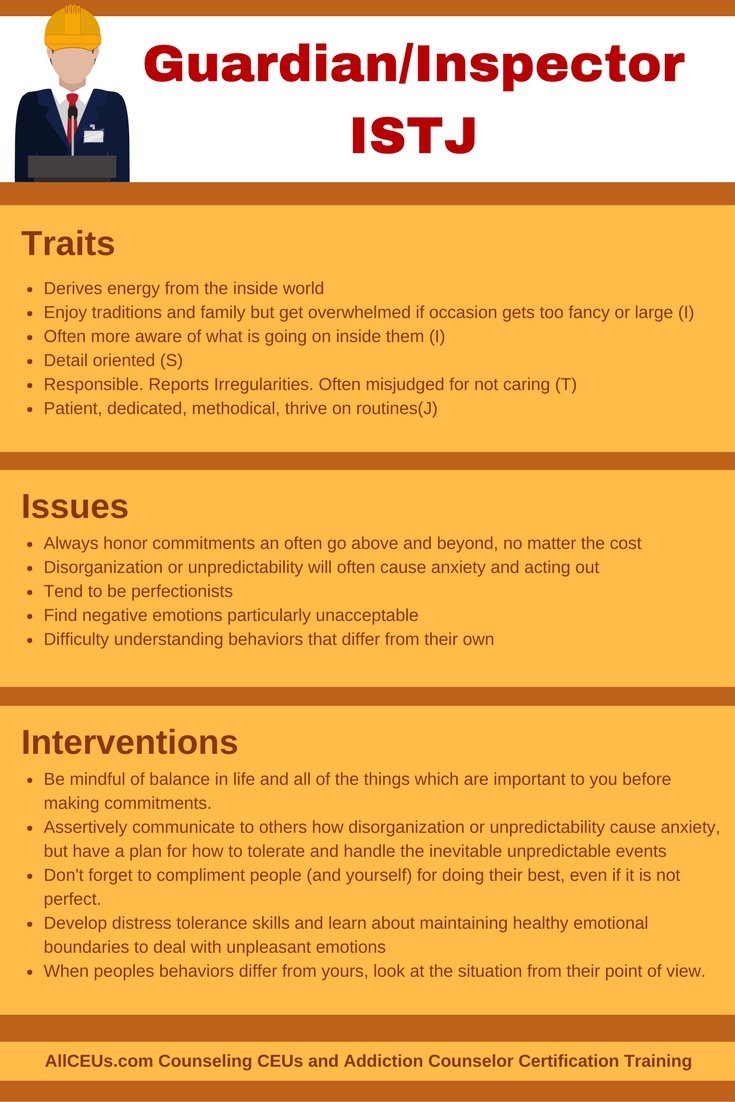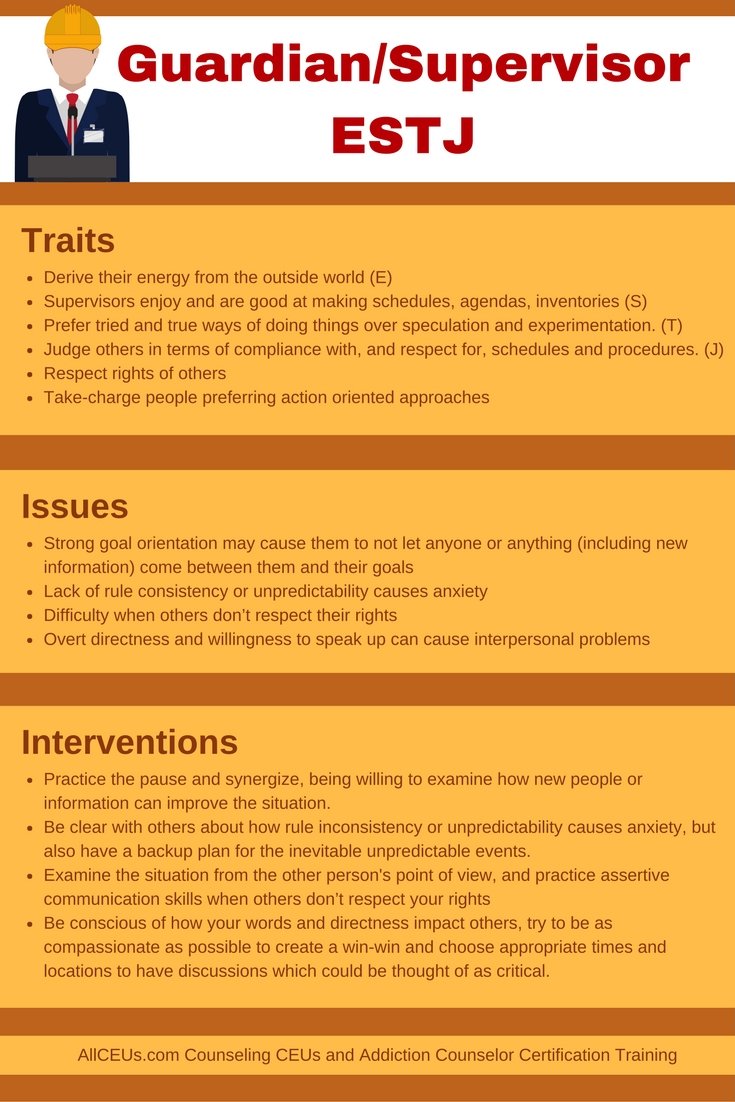

When working with other people, either as a supervisor or a clinician, or even a parent it is important to understand their personalities —what makes them tick and what makes them sick. This presentation reviews (briefly) the history of Jungian archetypes and the development of the modern personality/temperament sorters and explores the strengths, needs and stressors of each of the 16 temperaments.
Jungian Archetypes symbolize basic human motivations, values, and personalities.
~ The Persona The persona, derived from the Latin word for “mask” is how we present ourselves to the world
~ The Shadow The shadow is an archetype that consists of the sex and life instincts, composed of repressed ideas, weaknesses, desires, instincts, and shortcomings. (Dark side)
~ The Self ~ The self is an archetype that represents the unified unconsciousness and consciousness of an individual.
The MBTI and the Keirsey were derived from temperament work done by Jung. Each temperament has its own strengths and stressors.
Guardian/Supervisor ESTJ
~ Derive their energy from the outside world (E)
~ Supervisors enjoy and are good at making schedules, agendas, inventories (S)
~ Prefer tried and true ways of doing things over speculation and experimentation. (T)
~ Judge others in terms of compliance with, and respect for, schedules and procedures. (J)
~ Lack of rule consistency or unpredictability causes anxiety
~ Respect rights of others and have difficulty when others don’t respect theirs
~ Overt directness and willingness to speak up can cause interpersonal problems
~ Take-charge people preferring action oriented approaches
~ Strong goal orientation may cause them to not let anyone or anything (including new information) come between them and their goals
Guardian/Inspector ISTJ
~ Derives energy from the inside world
~ Enjoy traditions and family but get overwhelmed if occasion gets too fancy or large (I)
~ Often more aware of what is going on inside them (I)
~ Detail oriented (S)
~ Responsible. Reports Irregularities. Often misjudged for not caring (T)
~ Patient, dedicated, methodical, thrive on routines(J)
~ Always honor commitments an often go above and beyond, no matter the cost
~ Disorganization or unpredictability will often cause anxiety and acting out
~ Tend to be perfectionists
~ Find negative emotions particularly unacceptable
~ Difficulty understanding behaviors that differ from their own
Guardian Provider ESFJ
~ Popular with others, but peer relationships are extremely important (E)
~ Like work that produces a practical result (S)
~ Caring, sympathetic and warm hearted (F)
~ Respect authority and structure (J)
~ Difficulty getting work done because so involved in helping others
~ High anxiety to perceived unfairness
~ Over commitment increases anxiety. (If I don’t do it nobody will)
~ Giving directions is unappealing so they may expect mind-reading. When others fail à anger and disappointment
~ May get taken advantage of to preserve relationships
Guardian Protector ISFJ
~ Considerate, dedicated, service minded, quiet
~ Work well independently, observe what needs to be done and do it without discussion. (I)
~ Friendships are very important, but not as important as respect for authority (F)
~ Like things narrowly and completely defined to ensure meeting other’s expectations (S/J)
~ Often feel personally responsible for behavior of those around them. (Worrier / Boundaries)
~ May complain they have too much to do, but do not know how to ask for help. (Communication)
~ Need regular quiet time to get grounded
Artisan Promoter ESTP
~ Active, energetic and versatile, sociable (E)
~ Highly competitive. May avoid trying things they don’t think they can win (S)
~ Do what pragmatically solves the immediate problem (T)
~ Carpe-Diem (P)
~ Prefer kinesthetic learning / Sensitive to confinement (role plays, experiments)
~ Often ignore authority “It’s easier to ask for forgiveness than permission”
~ Thrive on attention from others
~ Present as hyperactive and impulsive
~ May say things hurtful in order to create “excitement”
~ Need to be challenged to take risks in constructive ways (Energy)
~ Don’t respond well to delayed gratification
Artisan Crafter ISTP
~ Calm observers of life. Independent loners (I)
~ Compelling need to know HOW things work (T)
~ May be stubborn if they see no point to an action
~ Master of improvisation (MacGyver) (P)
~ May procrastinate too much for tasks they abhor (Time management)
~ Often put up with whatever goes on around them until they cannot stand it then explode
~ Difficulty sharing what is going on inside them
~ Need to be encouraged to analyze and troubleshoot.
Artisan Performer ESFP
~ Extremely optimistic and value social fun, unhindered by standards, encourage others to be themselves (E)
~ Thrive on being center of attention (E)
~ Value themselves based on whom they make happy (F)
~ Flexible and adaptable (P)
~ Tend to respond to fights with humor and forgive easily (too easily?)
~ Especially vulnerable to peer pressure and take on characteristics of their friends
~ Dislike theoretical and prefer practical/generalizable skills
Artisan Composer ISFP
~ Easy going, positive outlook, cope will with change and get along with others
~ Little desire to change others, prefer to just observe (I)
~ Kindhearted and may take on the pain of others (F)
~ Minds tend to wander (P)
~ May “disappear” because of their quiet unassuming manner
~ Express themselves through action not words and can be indirect (i.e. sulking)
~ Many have a strong connection to nature
~ Love to read and write
~ Find it difficult to predict consequences of behaviors (Help make connections)
~ Do not like to say no and may frequently break commitments
Idealist Teacher ENFJ
~ Like to help others. Want to help them develop to highest potential (E)
~ Lead by communicating a vision that appeals (N)
~ Desire to understand themselves and others(F)
~ Need things settled and organized (J)
~ Always need the reasoning behind things
~ Sensitive to criticism, value conflicts and rejection
~ Take disagreement as a personal affront
~ Start working on projects once they have the overarching idea without waiting for details (Jump the gun)
~ Lack of harmony in an environment causes great distress
~ May lie to preserve harmony (2 BFFs)
Idealist Counselor INFJ
~ Compassionate, empathetic and intense. Difficult to get to know, not sharing their innermost thoughts. (I)
~ Love theoretical conversations (N)
~ Value harmony. Can see things from multiple perspectives (F)
~ Desire friendships, but introversion often prevents them from reaching out
~ Often over-empathize and can become distraught by media
~ Dislike disorder in relationships, environment or conversations
~ May fail to participate in group discussions/meetings
~ Often interrupt and finish other’s sentences based on what they “knew” was coming next
~ Enjoy reading
Idealist Champion ENFP
~ Not comfortable with sitting still or “down time” Can’t wait to tell others of extraordinary experiences (E)
~ Strong desire to speak out on issues
~ Tend to be romantic and highly sympathetic (F)
~ Usually have multiple things going on at once (P)
~ May annoy people by offering too much help, and get hurt when told to back off
~ Can fail to complete their own work because they are spending too much time helping others
~ May say they understand something when they only grasp the general idea
~ Constantly scanning the social environment, no intriguing silent motive is likely to escape their attention
Idealist Healer INFP
~ Like fantasy / daydreaming (I)
~ Divergent thinkers (N)
~ Tend to be highly idealistic (F)
~ Impatient with too many details (P)
~ Unmet expectations of others and situations can lead to despair and rejection
~ Difficulty appropriately communicating emotions
~ Lack of personal time and space can lead to irritability
~ Alternate between perfectionism and need for freedom
Rational Fieldmarshal ENTJ
~ Cheerful, confident, optimistic
~ Extremely opinionated and dominate discussions
~ Desire to control their outer world (E)
~ Strategic and goal driven (N /T /J)
~ Need to feel they are in control and not succumbing to the desires of others.
~ Escalating power struggles are the most common problem. Rejected ideas à Rejection of Rejector
~ Need assistance listening to and affirming other’s ideas
~ Believe anyone can do anything they set their mind to
Rational Mastermind INTJ
~ Autonomous, intricate thinkers
~ Intellectual, independent and self-confident (I)
~ Contingency planners (N/ T/ J)
~ Can get set on an idea and unaffected by external input
~ May have difficulty “switching gears” when they get focused
~ Losing a sense of competence in one area often is globalized to every area of their life.
~ Tend to excel at what they like and fail at what they dislike (session vs. notes)
~ Respond well when interventions are concrete and presented as experiments
~ So internally driven they forget others need praise
Rational Inventor ENTP
~ Can spontaneously talk about just about anything, preferring to focus on systems and patterns (E)
~ Generalists with insatiable curiosity (N)
~ Like learning facts and gaining tools (T)
~ Find it difficult to stay on task or deadline, always multitasking (P)
~ Need autonomy
~ Thrive on reinventing/improving upon everything
~ Find discussion useful to clarify thoughts
~ Often hide their negative feelings, preferring positivity
~ May have lofty, unrealistic goals
Rational Architect INTP
~ Detached, precise, cognitive, reserved (I)
~ Like to know a great deal about things (specialists) (I)
~ Master Designer (N)
~ Pragmatist (T)
~ May fail to complete projects getting lost in the process
~ Find writing a useful way to clarify thoughts
~ So internally engaged may have difficulty picking up on interpersonal cues and have poor social skills
~ May drift off to explore logical connections in the middle of a conversation
~ Can seem arrogant and may show impatience with others who have less ability, or who are less driven
View the Counseling CEU course for this presentation.
This course is also included in our unlimited CEU packages.
